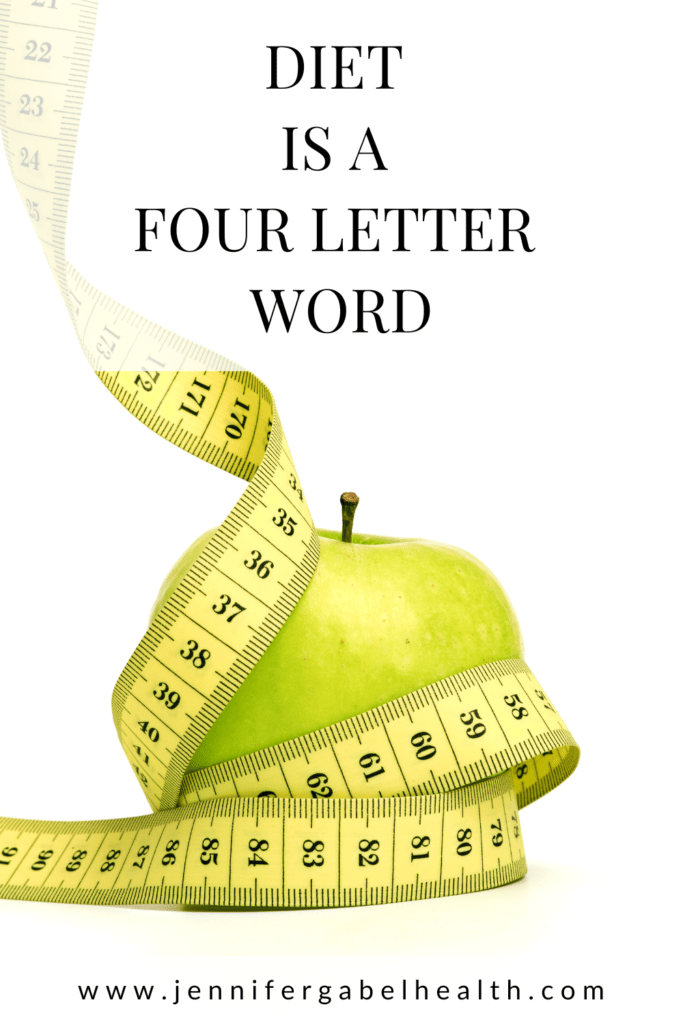Recently, I was at a wedding with a Venetian hour. If you don’t know what that is, instead of being served a slice of wedding cake, you’re invited to a dessert spread of epic proportions. In this case, it was an entire room of gelato, chocolate fondue, all different kinds of pastries, cookies and more.
As I’m walking through the room to see what was on offer, one of the guests turned to me and said, “There’s nothing here on your diet.” I turned to him and said, “I eat whatever I want.” And the part I left unsaid: “And I don’t want anything here.”
This aspect of my work is, without a doubt, the most difficult. Getting people to stop equating being healthy and being “on a diet” is a regular struggle for me. Most people think of the word “diet” as a prison with the sole purpose of weight loss. That’s why I joke that “diet” is a four-letter word because it’s used like a curse word.
Some other words I’d like to categorize as curse words when it comes to food are “cheat” and “bad”. When someone says “I cheated and ate cheesecake”, I always say “Who are you cheating on? Yourself?” When someone says “I was bad this weekend”, my response is “Did you rob a bank?”
To be honest, I don’t like the word “good” either. When people tell me they were good all week, what they mean is they ate perfectly according to some external rules (diet prison mentality). Since no one can be perfect forever, they’ll inevitably eat something outside of those rules and consider themselves “bad”. Because if a person isn’t good, then bad is the only other option. What’s worse is that by living in this all-or-nothing mindset, they wind up eating even more things they consider “bad”, all with the promise that they’ll be “good” tomorrow…or Monday…or in January.
Here’s an alternative to consider. What if a diet is simply what you eat most of the time? For example, my diet consists of mostly whole foods with an emphasis on plants. I can eat whatever I want; however, I choose to eat what makes me feel good.
Speaking of which, the only way I like to use the words “good” and “bad” when it comes to food is in terms of how it tastes and how it makes me feel. Stable blood sugar makes me feel good. Having clear skin makes me feel good. Getting quality sleep and having a ton of energy makes me feel good. Therefore, my diet, my way of eating, makes me feel good.
Do you know what else makes me feel good? Going out for ice cream with my kids on a hot summer day. A cold beer and a soft pretzel at a Yankee game. A croissant in Paris, gelato in Italy, bread pretty much anywhere that bakes it the old-fashioned way. These are joy-filled choices, which absolutely contribute to my overall health, even if they don’t seem healthy at a glance. I’m not being “bad” when I have them, and I’m not “cheating” on my diet. Remember, my diet consists of mostly whole foods with an emphasis on plants. The word “mostly” is important because it leaves room for joy and flexibility. These particular choices are special because they’re also rare.
When it comes to health and wellness, it’s important to assess how you use your words. Words have power, and when we use certain words in a punishing way, we are cursing ourselves. On the other hand, we can reclaim that power at any time by remembering that we always have a choice and to make those choices with intention.


Love this!
I’m on board with you. No counting calories, No eliminating certain foods, no dieting, just eating healthy at regular intervals to keep the body happy! And a sweet treat or glass of bubbly when the occasion arises!!